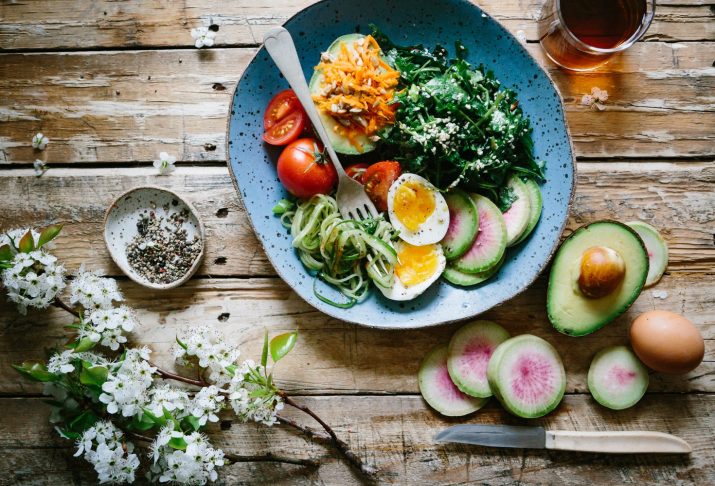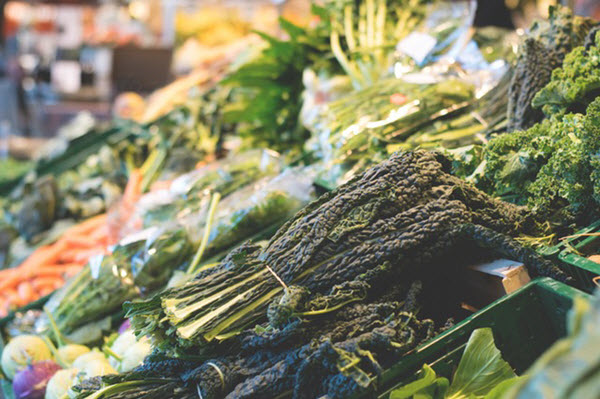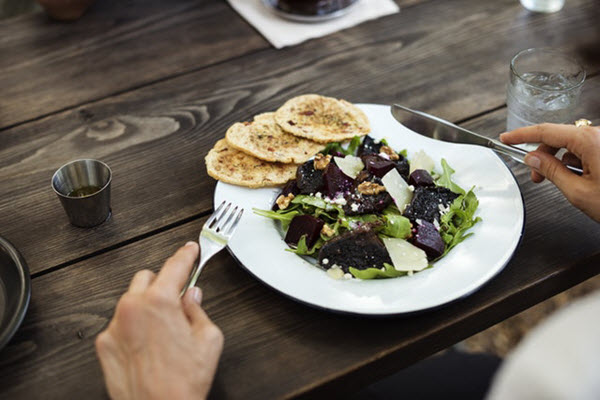The 11 Most Important Rules For Healthy Eating
By SJW
November 27, 2019 • Fact checked by Dumb Little Man

You know what to do in theory, don’t you?
Avoid processed foods and trans fats. Include more lean protein and load up on the fresh fruits and veggies. Looks easy, right?
Well, of course, that's until you realize that the last time your weekly menu even partially resembled such a wholesome eating plan was sometime in the early 90’s. That was before stress, adulthood or the perils of keeping up online took over your life.
These days, the idea of eating healthy sounds moderately confusing at best. Fortunately, it doesn’t have to be that complicated. In fact, if you follow these 11 rules for healthy eating, you just might find that it’s a lot easier than you initially thought.
Eat food that is as close to its natural state as possible

While it’s true that not everything found in nature is good for you, the stuff that’s been classified as food is a pretty safe bet. The advent of the modern-day diet industry initially taught us that we know better than Mother Nature. But really, what are the chances of that?
Over the past 50 years, people have adhered to really strict diets. Despite that, the rates of obesity, diabetes, and heart disease have skyrocketed.
Now, isn’t it time we got back to basics?
My rule is to always choose foods that are as close to their natural state as possible. Eat the whole egg, not just the white. Choose full-fat organic dairy over low-fat, antibiotic-ridden dairy. Include a small amount of nature’s fats (organic meat, avocado, oils, nuts and seeds) in your diet rather than opting for the packaged foods. They may be low in fat, but they are typically high in sugar, synthetic chemicals, and heavens knows what else.
Calories don’t count
Visit the tribes of the Maasai people in Africa or the Brazilians who live deep within the Amazon and you’ll visit a people exuding health, energy, and – for the most part – an enviable physique.
Ask them how many calories they stick to each day in order to be so healthy and you just might be laughed out of the jungle. And you know what? This is not a situation unique to uncivilized people groups.
Take a trip to the typical Frenchwoman’s home or head over to the Dominican Republic. You’ll find a similar situation, possibly minus the hunting and sparse clothing.
If you choose to eat a balance of natural foods, you’ll soon learn that calories don’t count. This is because when it comes to energy in versus energy out, 2 + 2 does not always make 4.
Your body is perfectly capable of doing whatever it wants with the foods you eat. I’ve seen people gain weight and feel awful on a low-cal diet while others regularly indulge in meat, (good) fats, and a daily feast of vegetables, seeds, full-fat dairy, and nuts.
It’s all about listening to your body which is tough to do if your mind is overwhelmed with sugar and chemicals from all that low-fat food.
Avoid dieting
If you’re not going to count calories, then I guess you’d better give up dieting as well.
I don’t have to tell you that most diets depend on restricting something– whether it’s calories, a certain food group, foods at a certain time of day, etc. In fact, I’m sure you’ve been there at least once.
Well, the evidence is in and it’s not pretty. Studies have shown that the more frequently you’ve dieted, the greater your chances of being overweight and even obese later in life.
Dieting also puts you at greater risk of developing food intolerance and digestive problems due to the over-consumption of certain foods as others are excluded. Throw out the diet books, switch off Oprah, and take the time to find a lifestyle diet that will work for you for the long-term.
Include protein

Protein-based foods are the building blocks of a healthy diet and protein has several important roles in your body. The list includes cell repair, cell regeneration, hormone production, and blood sugar management.
In fact, pretty much every different diet, while possibly excluding carbohydrate or fat, recommends some form of protein. This alone should indicate how important it is.
In my experience, most people do not eat enough protein. If you think some chicken breast in your evening stir-fry or a slice of ham in your lunch focaccia is going to cut it, think again. I’m talking quality protein at all 3 main meals and possibly in between, depending on your level of activity.
Your main sources of protein should be from natural sources such as dairy, eggs, poultry, meat, and fish. Legumes, nuts, and seeds also provide some protein.
My personal recommendation is to stay away from soy. Many natural health experts are now linking it to hormonal imbalance and increased toxicity in your body. Read The Whole Soy Story by Kayla Daniels for more information on this.
Be smart about fat
If you’ve heard of Omega 3, then you’re already onto the benefits of smart or good fats. The most commonly known smart fats are the essential fatty acids Omega 3 (O3) and Omega 6 (O6). It’s crucial that you include these fats in your diet as your body is not able to produce them and they are critical to your health.
Good fats serve many wonderful purposes, including the reduction of inflammation, improved detoxification, and they’ve also been linked to weight loss.
The typical Western diet tends to emphasize O6, through over-consumption of vegetable oils such as corn oil, sunflower oil, and safflower oil. Corn oil in particular, is used in most baked and processed foods.
A healthy diet should include an O6:O3 ratio of anywhere between 1:1 and 1:4, so it’s crucial that you take steps to increase your O3 intake. You can easily do this by including eggs, walnuts, oily fish, flax seeds, leafy greens, and a good (mercury-free) O3 supplement.
In nature, you would eat up to 40 grams of O3 each day. considering that a heart salmon steak only has around 7 grams of O3, I’d say that supplementation is a good option for everybody!
Choose foods you enjoy

What’s the point in trying to be healthy if it’s all uphill work?
Many people I speak to are convinced that switching to a healthy eating plan requires them to give up everything they love and subsist on dry crackers with the occasional raw vegetable stick. The reality couldn’t be further from this miserable scenario.
A truly healthy diet is one that embraces all elements of what nature has to offer. If you include loads of variety in your day-to-day food choices and plenty of nature’s rich indulgent foods along the way, then you’ll not only be eating as you should be. You’ll be enjoying a feast everyday.
Of course, you don’t have to eat every different food out there. If there’s something you especially loathe, then just steer clear. Myself, I’m not a big fan of broccoli and it never features in my diet.
When switching to a purely natural diet, it can initially be tough to adapt to foods and flavors that are not overly sugared or caked in chemicals. But rust me, give yourself a week or so and you’ll realize just how delicious real food can be. Try going back to a junk food or packaged food diet after this and I guarantee you’ll be digging your heels in every step of the way.
Be adventurous with herbs, spices, and traditional foods
Of course, part of enjoyment is being adventurous with different tastes. I know I’d get pretty bored living entirely on meat and vegetables night after night. The good news is that herbs and spices from all the corners of the world are a great way to make things interesting. They have tremendous health benefits to boot, too.
Chili, for example, has been said to increase your metabolism. Parsley keeps your breath fresh and garlic may help to lower blood pressure.
You can also freely add organic sea salt to any of your food. I love my salt so much that I actually add it to my drinking water from time to time. It’s a great way to re-mineralize purified tap water.
Organic sea salt can be found at your local health or organic store. It's grey or pink in color. Often, it comes in chunks and contains over 90 different essential minerals – what a wonderful addition to your diet.
It’s also worth considering traditional foods such as raw cacao and coconut oil which is high in medium-chain fatty acids and great for your liver and metabolism. Wild berries, such as the goji berry, are also nice because they are high in antioxidants.
Eat when you’re hungry but not before
There is so much information out there telling you what to eat. Just trying to read and decipher it all is a headache in itself. That’s without even considering additional questions such as how often you should eat.
It’s popular for modern-day diets to recommend that you eat small meals at regular intervals throughout the day. This approach has taken off as it’s said to regulate blood sugar levels and ensure you don’t give in to the temptation that can come about when hunger’s a-gnawing. While this is a good approach for many people, it’s not necessarily the right one for you.
The truth is that some people do need to eat 5 or 6 or even more small meals each day. Others function and look their best when they eat only 2 to 3 times per day. If you consider yourself someone who ‘lives to eat’ as opposed to ‘eats to live’, you probably fall into the first category.
It’s important that you listen to your body. The key to health and ideal weight is to wait until you are hungry to eat. Not starving, mind you. But you definitely shouldn’t be eating ‘just because’ it’s lunchtime.
See Also: Eating Mindfully: What It Is and What It Can Do To Your Body
Quality counts

It stands to reason that a diet rich in nature’s rich foods is one with a focus on quality. Unfortunately, the typical supermarket products are often produced as efficiently (cheaply) as possible. That's why you pay the price with your health.
There’s a tremendous difference, for example, in the health-giving benefits of a caged egg (which has an O6:O3 ratio of around 20:1) compared with an organic egg (which has ideal O6:O3 ratios).
According to many health experts, supermarket fruits and vegetables are mostly covered with dyes, waxes, and even fresh smells in order to trick you into believing they’re fresh.
I’ve heard of one major supermarket chain that keeps its apples in its warehouse for up to 12 months!
My recommendation is to buy from smaller grocers, markets or organic stores wherever possible. When it comes to meat and dairy, choose organic or at least free-range.
If it sounds too good to be true, it probably is
If a product tells you it’s low-fat or low-cal or maybe even low-sugar and still promises to deliver all the taste of its more natural cousins, then you can bet there’s a problem.
Your body was not designed to subsist on foods that come in a package or are all but 100% man-made in an effort to meet the latest government ideal of what’s good for you. A simple check to determine the BS factor on any product is to check the ingredients label.
I tell my clients that the longer the list, particularly if it includes things you can’t pronounce, the worse it is for you. I don’t have to tell you that healthy eating is built on real food, not chemicals and artificial sweeteners.
Be realistic and don’t be afraid to break the rules once in a while
It’s all very well to proudly follow a healthy diet. I do believe that you really will feel so good eating this way that you simply won’t want to revert to old habits.
But we all have occasions where we just can’t be bothered making an effort, such as when we run out of time or when we’ve simply earned the right to indulge and let loose. In my opinion, this is actually an important element of healthy eating.
Binging on chocolate or chips is not healthy, but taking the time to enjoy them ‘just because’ is great for the soul. It can even benefit your body, particularly if it means keeping yourself on track the rest of the time.
I recommend you follow the 80/20 rule.
Make an effort and eat the right foods 80% of the time and let your hair down the other 20%. Just don’t be surprised if it ends up being only 10% as your energy, health, and motivation builds with each consecutive day of healthy eating!
See Also: The Best Kitchen Gadgets for Healthy Cooking You Should Own
What tricks or techniques do you use to motivate yourself toward regular healthy eating? Do you have a #12 that we should add to this article?
Written by Kat Eden, is a personal trainer from Australia. Visit her blog Body Incredible to be inspired with the latest nutrition tips, weight loss advice, and motivational thinking.







